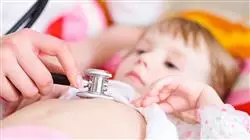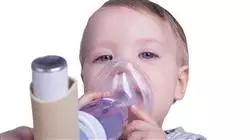University certificate
The world's largest faculty of nursing”
Introduction to the Program
It is necessary to train nursing professionals to acquire the knowledge, skills and attitudes that will enable them to approach and manage children in emergency situations in all their dimensions and at all levels of care"

Children represent one of the most vulnerable groups in terms of morbidity and mortality, naturally due to the special conditions in which they find themselves during the perinatal stage and infancy, related to the biological processes of reproduction, growth and development.
In addition to prevention and family education, emergency care is paramount to maintaining the health status of children, and both emergency departments and the professionals who work in them play a key role in urgent pediatric care.
In addition to their general training, nursing professionals who perform their care function in pediatric patient care services must have acquired the necessary knowledge and skills for their daily practice with Critically Ill Pediatric Patients, and it is essential to update this knowledge and skills through adapted training programs.
The Postgraduate diploma in Frequent Pediatric Emergencies for Nursing is designed to enable nursing professionals to incorporate the advances that are taking place in the discipline, in addition to reviewing the most important aspects of emergency care for pediatric patients and their care.
Scientific evidence increases the quality of medical care. Staying up-to-date is key to providing better care for patients with problems”
This Postgraduate diploma in Frequent Pediatric Emergencies for Nursing contains the most complete and up-to-date scientific program on the market. The most important features include:
- Clinical cases presented by experts in the different specialties
- The graphic, schematic, and practical contents with which they are created provide scientific and practical information on the disciplines that are essential for professional practice
- Diagnostic and therapeutic novelties on child care. It includes pediatric triage in nursing, as well as the approach to pediatric abdominal pain, diarrhea and constipation, celiac disease, hepatitis, ketoacidosis, renal insufficiency, infectious pathologies, trauma, psychiatric disorders, etc
- Specific sections in each module on nursing techniques and procedures according to the child's age: catheterization, ostomy management, ophthalmologic examination, foreign body extractions, etc
- Video lessons on the different pathologies and their management
- An algorithm-based interactive learning system for decision-making in the clinical situations presented throughout the course
- Includes theoretical lectures, questions to the expert, discussion forums on controversial issues and individual reflection papers
- Content that is accessible from any fixed or portable device with an Internet connection
This Postgraduate diploma is the best investment you can make when selecting a refresher program, for two reasons: in addition to updating your knowledge in Frequent Pediatric Emergencies for Nursing, you will obtain a certificate issued by TECH Global University"
Its teaching staff includes leading nursing professionals, who bring their work experience to this program, as well as other professionals who specialize in the various fields of pediatric emergency care.
Thanks to its multimedia content developed with the latest educational technology, it will allow the professional a situated and contextual learning, that is to say, a simulated environment that will provide an immersive learning programmed to prepare for real situations.
This program is designed around Problem-Based Learning, whereby nursing professionals must try to solve the different professional practice situations that arise throughout the program. For this purpose, students will be assisted by an innovative, interactive video system created by renowned and experienced experts in pediatric emergencies with extensive teaching experience.
It contains simulated clinical cases to bring the program development as close as possible to the reality of pediatric emergencies"

Don't miss the opportunity to update your knowledge in the most frequent pediatric emergencies to increase the quality of your care"
Why study at TECH?
TECH is the world’s largest online university. With an impressive catalog of more than 14,000 university programs available in 11 languages, it is positioned as a leader in employability, with a 99% job placement rate. In addition, it relies on an enormous faculty of more than 6,000 professors of the highest international renown.

Study at the world's largest online university and guarantee your professional success. The future starts at TECH”
The world’s best online university according to FORBES
The prestigious Forbes magazine, specialized in business and finance, has highlighted TECH as “the world's best online university” This is what they have recently stated in an article in their digital edition in which they echo the success story of this institution, “thanks to the academic offer it provides, the selection of its teaching staff, and an innovative learning method aimed at educating the professionals of the future”
A revolutionary study method, a cutting-edge faculty and a practical focus: the key to TECH's success.
The most complete study plans on the university scene
TECH offers the most complete study plans on the university scene, with syllabuses that cover fundamental concepts and, at the same time, the main scientific advances in their specific scientific areas. In addition, these programs are continuously being updated to guarantee students the academic vanguard and the most in-demand professional skills. In this way, the university's qualifications provide its graduates with a significant advantage to propel their careers to success.
TECH offers the most comprehensive and intensive study plans on the current university scene.
A world-class teaching staff
TECH's teaching staff is made up of more than 6,000 professors with the highest international recognition. Professors, researchers and top executives of multinational companies, including Isaiah Covington, performance coach of the Boston Celtics; Magda Romanska, principal investigator at Harvard MetaLAB; Ignacio Wistumba, chairman of the department of translational molecular pathology at MD Anderson Cancer Center; and D.W. Pine, creative director of TIME magazine, among others.
Internationally renowned experts, specialized in different branches of Health, Technology, Communication and Business, form part of the TECH faculty.
A unique learning method
TECH is the first university to use Relearning in all its programs. It is the best online learning methodology, accredited with international teaching quality certifications, provided by prestigious educational agencies. In addition, this disruptive educational model is complemented with the “Case Method”, thereby setting up a unique online teaching strategy. Innovative teaching resources are also implemented, including detailed videos, infographics and interactive summaries.
TECH combines Relearning and the Case Method in all its university programs to guarantee excellent theoretical and practical learning, studying whenever and wherever you want.
The world's largest online university
TECH is the world’s largest online university. We are the largest educational institution, with the best and widest online educational catalog, one hundred percent online and covering the vast majority of areas of knowledge. We offer a large selection of our own degrees and accredited online undergraduate and postgraduate degrees. In total, more than 14,000 university degrees, in eleven different languages, make us the largest educational largest in the world.
TECH has the world's most extensive catalog of academic and official programs, available in more than 11 languages.
Google Premier Partner
The American technology giant has awarded TECH the Google Google Premier Partner badge. This award, which is only available to 3% of the world's companies, highlights the efficient, flexible and tailored experience that this university provides to students. The recognition as a Google Premier Partner not only accredits the maximum rigor, performance and investment in TECH's digital infrastructures, but also places this university as one of the world's leading technology companies.
Google has positioned TECH in the top 3% of the world's most important technology companies by awarding it its Google Premier Partner badge.
The official online university of the NBA
TECH is the official online university of the NBA. Thanks to our agreement with the biggest league in basketball, we offer our students exclusive university programs, as well as a wide variety of educational resources focused on the business of the league and other areas of the sports industry. Each program is made up of a uniquely designed syllabus and features exceptional guest hosts: professionals with a distinguished sports background who will offer their expertise on the most relevant topics.
TECH has been selected by the NBA, the world's top basketball league, as its official online university.
The top-rated university by its students
Students have positioned TECH as the world's top-rated university on the main review websites, with a highest rating of 4.9 out of 5, obtained from more than 1,000 reviews. These results consolidate TECH as the benchmark university institution at an international level, reflecting the excellence and positive impact of its educational model.” reflecting the excellence and positive impact of its educational model.”
TECH is the world’s top-rated university by its students.
Leaders in employability
TECH has managed to become the leading university in employability. 99% of its students obtain jobs in the academic field they have studied, within one year of completing any of the university's programs. A similar number achieve immediate career enhancement. All this thanks to a study methodology that bases its effectiveness on the acquisition of practical skills, which are absolutely necessary for professional development.
99% of TECH graduates find a job within a year of completing their studies.
Postgraduate Diploma in Frequent Pediatric Emergencies for Nursing
Performing efficiently in high-stress situations is a real challenge for all professionals in the field of pediatric emergencies, since work practice demands different skills that provide the patient with a service that meets their needs. The Postgraduate Diploma in Frequent Pediatric Emergencies for Nursing of TECH Global University, provides individuals interested in expanding their academic horizon, updated content, which will boost their capabilities to perform processes of accompaniment and care with the highest quality standards. In addition, with the training received throughout the program, they will have the necessary knowledge to manage patients affected by different pathologies, providing the necessary primary care until the arrival of specialized doctors.
Postgraduate Certificate in Pediatric Emergencies 100% online
This TECH program was structured by the best specialists in the field, as a result, students will be able to access sophisticated thematic axes that have the most recent advances in the field and through which the progress of each one in different conceptual areas will be guaranteed. Likewise, with the objective of not only improving the theoretical background, we will confront the applicants with simulated practical situations based on real life, which will be fundamental to improve their technical skills to face the different challenges that will arise during the work practice.







